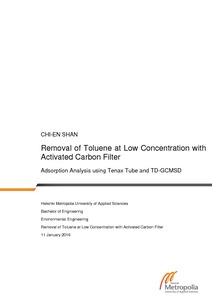Removal of Toluene at Low Concentration with Activated Carbon Filter : Adsorption Analysis using Tenax Tube and TD-GCMSD
Shan, Chi-En (2016)
Shan, Chi-En
Metropolia Ammattikorkeakoulu
2016
All rights reserved
Julkaisun pysyvä osoite on
https://urn.fi/URN:NBN:fi:amk-201601111216
https://urn.fi/URN:NBN:fi:amk-201601111216
Tiivistelmä
Various studies have demonstrated the usefulness of adsorption of activated carbon on VOCs removal. Large porosity and high adsorption allows activated carbon to remove very small particles. This project was commissioned by the company name Genano Oy to test the activated carbon filter in their air purifier and hence to provide a database for the company. The purpose of this thesis was to study the effectiveness of impregnated activated carbon filter on toluene removal.
Experiment was conducted with a pipe model consisting activated carbon filters to simulate a ventilation system. Two batches of activated carbon were used, and one to three layers of filters containing these activated carbon were made. Toluene was prepared at low concentration. The samples before and after contacting the activated carbon filter inside the pipe model were taken by tenax tubes. At last, the results were analyzed by using a thermal desorber gas chromatography mass selective detector.
The results of this thesis indicate that filters with one layer of impregnated activated carbon had a removal efficiency around 40 %. Based on these results, impregnated activated carbon revealed their potential on VOCs removal.
Experiment was conducted with a pipe model consisting activated carbon filters to simulate a ventilation system. Two batches of activated carbon were used, and one to three layers of filters containing these activated carbon were made. Toluene was prepared at low concentration. The samples before and after contacting the activated carbon filter inside the pipe model were taken by tenax tubes. At last, the results were analyzed by using a thermal desorber gas chromatography mass selective detector.
The results of this thesis indicate that filters with one layer of impregnated activated carbon had a removal efficiency around 40 %. Based on these results, impregnated activated carbon revealed their potential on VOCs removal.
